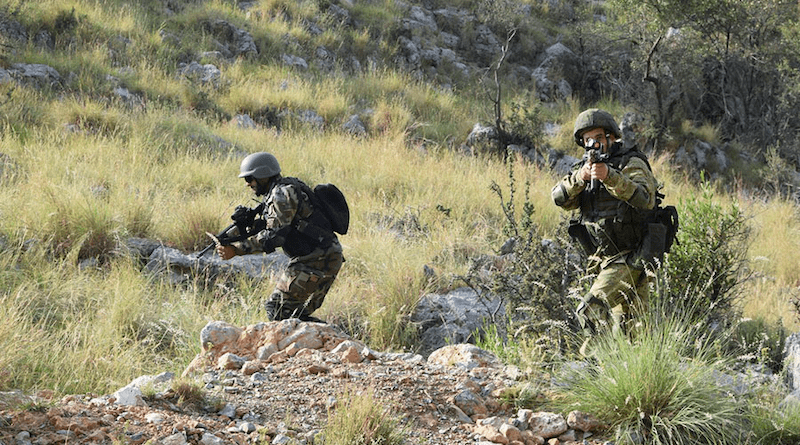Allocation Of Pakistan’s Defense Budget And The Security Conundrum – OpEd
Pakistan, being a country in a volatile region, has long been facing security challenges. Its neighbors, India and Afghanistan, have a history of tension with Pakistan, and the presence of various hostile elements within the country adds to the security concerns. To counter these threats, Pakistan has been allocating a reasonable portion of its budget towards defense. However, despite facing unprecedented challenges both on the western and eastern fronts as well as hybrid warfare threats, Pakistan Army did not increase its defence budget to support the country’s economy.
Firstly, Pakistan is surrounded by hostile neighbors. India, with whom Pakistan has fought several wars, has a massive military force and has been modernizing its military with advanced weapons and equipment. This presents a threat to Pakistan’s security, and to counter this, Pakistan has to maintain a credible deterrence. It is imperative for Pakistan to allocate a significant portion of its budget to maintain a strong defense against any potential aggression. But, Over the past fifty years, Pakistan’s Defence budget as a percentage of GDP has gone down, drastically, from 6.50 percent of GDP in the 1970s to 2.54 percent in 2021. In Budget 2021-22, ‘Defence Services’ was allocated Rs1,370 billion out of total budgetary resources of Rs 8,487 Bn which is a mere 16 percent of the total budgetary resources.
Out of this 16 percent allocation, Pakistan Army gets Rs 594 billion or 44 percent. In effect, Pakistan Army gets a paltry 7 percent of the total budgetary resources. Pakistan Army in the year 2019, had also relinquished Rs 100 billion of its budgetary allocation to support economy of the country.
Secondly, Pakistan has been facing internal security threats in the form of extremist groups. These groups have carried out numerous terrorist attacks in the country, targeting civilians, security forces, and government installations. To counter these threats, Pakistan needs to maintain a strong security apparatus, which requires a significant investment in defense. The security forces need to be equipped with modern weapons, communication systems, and other necessary equipment to effectively tackle these threats.
Pakistan’s geography also plays a crucial role in its security situation. The country has a long border with Afghanistan, a country that has been in a state of war for over two decades. Pakistan has been hosting millions of Afghan refugees, and the presence of extremist groups in Afghanistan has also led to the rise of extremism within Pakistan. To counter these challenges, Pakistan needs a strong defense that can effectively tackle any potential threats emanating from its western border.
Lastly, Pakistan is also facing challenges in the form of hybrid warfare. India has been using non-state actors to destabilize Pakistan, and the country has also been subjected to cyber-attacks and propaganda campaigns. To counter these threats, Pakistan needs a strong defense that can not only tackle conventional threats but also non-conventional threats.
However, a report by SIPRI places Pakistan at 23rd in the list of world’s top 40 countries with the highest military expenditure, one position below as compared to 2020, which shows Pakistan Army’s commitment to assist government by spending less on the military expenditure.
According to SIPRI Military Expenditure Database and The Military Balance from the International Institute for Strategic Studies, the countries that spend more on defence in comparison to Pakistan (2.54 GDP) include Oman (12 percent of GDP) Lebanon (10.5 percent), Saudi Arabia (8 percent), Kuwait (7.1 percent), Algeria (6.7 percent), Iraq (5.8 percent), UAE (5.6 percent), Azerbaijan (4 percent), Morocco (5.3 percent), Israel (5.2 percent), Jordan (4.9 percent), Armenia (4.8 percent), Mali (4.5 percent), Qatar 4.4 percent, Russia 3.9 percent, US 3.4 percent and India (3.1 percent).
Pakistan’s defence budget on a per capita basis is one of the lowest in the world. Pakistan spends $40 on a per capita basis while Israel spends $2,200 on a per capita basis. Even after having one of the lowest defence budgets in the world, according to Global Firepower Index, Pakistan’s Armed forces are “ranked as the 9th most powerful military in the world.”
The defense budget of Pakistan is a need for its security situation. The country faces external threats from its hostile neighbors, internal threats from extremist groups, challenges emanating from its western border, and hybrid warfare. To counter these challenges, Pakistan needs to maintain a strong defense that can effectively tackle these threats. The defense budget of Pakistan is not a luxury but a necessity to ensure the country’s security and stability.
Humais Sheikh, has completed his Master’s from Quaid-I-Azam University Islamabad in Defense and Strategic studies. He is an independent defense analyst and Ex. Vice president of Defense and Strategic Studies student’s society.

